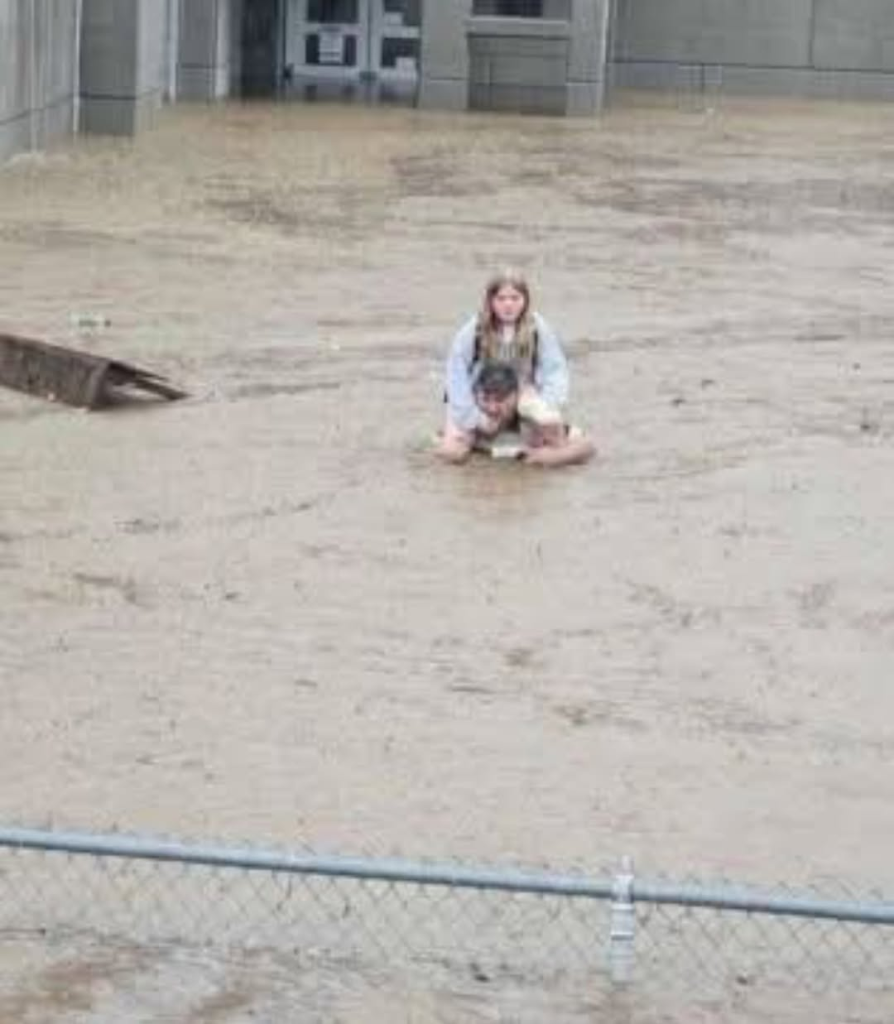When a small school in Westernport, Maryland began to flood on a quiet Tuesday afternoon in June, panic was swift. Water gushed through hallways like a roaring river, and the structure shook as though bending toward collapse. Inside, children were trapped, eyes wide with fear, their afternoon of lessons turning into a storm of dread.
Amid the chaos, one father did not wait for official orders. Amid the swirl of emergency crews and equipment—which, in that moment of crisis, seemed to move in slow motion—this father broke through the panic and charged toward the door where his 9-year-old daughter would have been waiting. The school was still half-submerged, and rising water threatened to sweep everything away at any second.
Eyewitnesses say that first, the father—unarmed, unprotected, just a parent in a dad’s clothes—paused for only a fraction of a second. Then, as if compelled by an unspoken force, he plunged into the torrent. The water was waist-deep at best, but with the slippery floor and floating debris, every step could have been his last. Yet he waded in, hands outstretched, determined to find his child before disaster struck.
“Some accused him of risking his own—and his daughter’s—life,” recalls a school counselor who witnessed the scene. “An unforgivable gamble, they said. He could have made it worse.” Meanwhile, others called him a hero without waiting for a medal: “Father of the Year,” they cheered, swelling his image into legend in their hearts.

In interviews afterward, the father insisted he acted out of clarity, not impulse. He’d been worried—not about what could go wrong—but about what would go wrong if he hesitated even a moment. For him, the blur of flooding corridors, the alarm bells, the frantic shouts—they all narrowed to one purpose: retrieve his daughter.
When he broke through the last doorway, he found her clutching a chain of shocked classmates. She froze—but only for a heartbeat. Then she recognized him and raced into his arms. It wasn’t a Hollywood leap, but in that moment of reunion—drenched clothes, terrified eyes, the roar of rushing flood just feet away—everyone present felt time split in two: Before and after.
The rescue ended without tragedy. The father and daughter emerged together, soaked and shaken—but alive, safe, together. Emergency crews arrived moments later, managing to evacuate the rest of the children. But by then, the story had already written itself. Responses poured in: Some accused him of recklessness, of playing Russian roulette with his child’s life. Others celebrated him as a portrait of fearless love—a parent who acted when protocol dictated waiting.
Outside the flood’s fury, this moment cracked open a deeper conversation: When do we trust systems and professionals, and when do we rely on raw human instinct? In that instant, amid rising currents and splitting concrete, one man answered that question for himself—and rescued his daughter.
Many parents, reading this, may nod in recognition: the feeling of not trusting the system to move fast enough, the unshakeable belief that “if it were my child, I’d do exactly the same.” Fear isn’t the opposite of courage—it often becomes its fuel.
As for Westernport, the town’s spirit rallied around the father-daughter pair. Teachers, neighbors, and local leaders offered their hands and hearts to both, underscoring a community’s instinct to defend, commend, and reckon—when one of their own steps into harm’s way only to bring someone back.